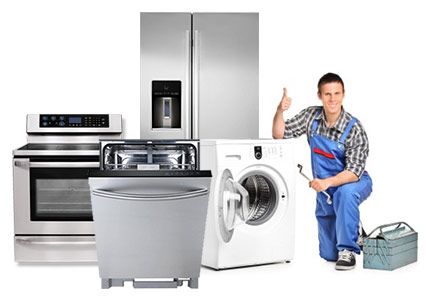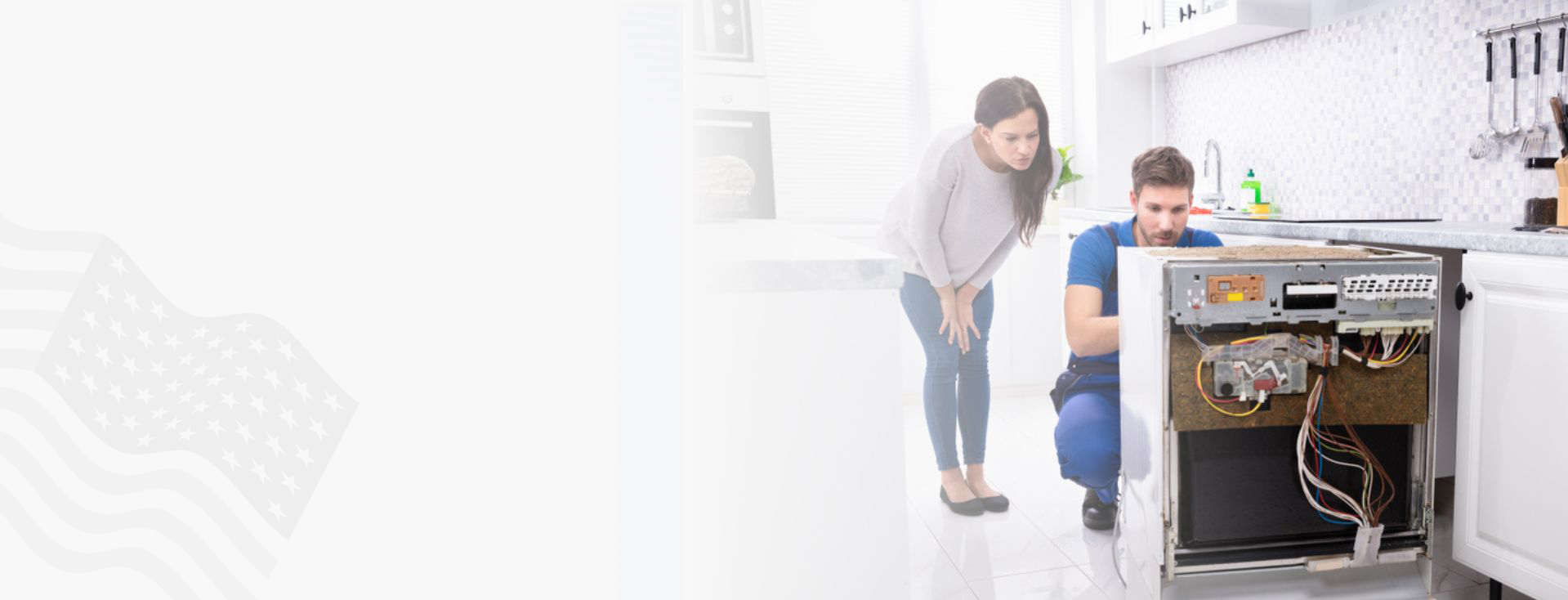Steps to Fix Drainage Problems – Dependable Refrigeration & Appliance Repair Service Washing Machine Repair
Steps to Fix Drainage Problems – Dependable Refrigeration & Appliance Repair Service Washing Machine Repair
Blog Article
The Ultimate Guide to Recognizing Device Repair Service in the house
When your refrigerator quits cooling or your oven rejects to warm, it can feel overwhelming. Understanding appliance repair at home can conserve you money and time. You'll learn to acknowledge signs and symptoms, use crucial devices, and comply with a systematic troubleshooting process. Before you begin, there are vital safety and security preventative measures you require to take right into account. What are one of the most usual issues, and just how can you fix them? Let's explore the fundamentals.
Typical Appliance Issues and Their Signs and symptoms
When your devices start breaking down, it's essential to acknowledge the indicators early on. Disregarding them can cause larger problems and costly repair services. If your refrigerator isn't cooling effectively, you might notice warm spots or condensation forming. This might suggest a stopping working compressor or an obstructed vent.Your dishwashing machine may reveal problems through unclean meals or uncommon noises during cycles. If you listen to grinding or clanking, it's time to investigate.A washing maker that will not rotate or drain pipes can leave you with soaked laundry, recommending a clogged drain or a malfunctioning pump.Lastly, if your stove's temperature level appears off or it takes permanently to preheat, you could be handling a defective thermostat. By remaining alert to these symptoms, you can address problems before they escalate into major repair services.
Essential Devices for Home Appliance Repair Service
When you're taking on home appliance fixings in your home, having the right tools is important. Fundamental hand devices like screwdrivers and pliers will certainly aid you dismantle and repair various devices, while electrical screening devices guarantee you're working securely with circuitry. Allow's look at what you need to get started on your repair service trip.
Basic Hand Devices
Having the right tools is crucial for reliable appliance fixing at home. Beginning with a reputable screwdriver collection, including both flathead and Phillips kinds, as screws are usual in home appliance setting up. Pliers are additionally important; they aid with gripping, twisting, and cutting cables or tiny parts. A set of needle-nose pliers can reach limited areas conveniently. You'll need a good adjustable wrench for tightening up or loosening up nuts and bolts. An utility knife comes in handy for cutting with product packaging or insulation. Ultimately, don't fail to remember a durable workbench or surface area to safely arrange your tools and components. With these standard hand devices, you'll be well-prepared to deal with most appliance repair work that come your way.
Electric Screening Tools
Along with standard hand devices, electrical screening devices play a vital duty in device repair. These devices assist you identify electric issues and guarantee appliances work safely. A multimeter is essential; it gauges voltage, current, and resistance, enabling you to identify problems quickly. A non-contact voltage tester is another must-have, allowing you find online cables without making direct get in touch with, enhancing your safety. Secure meters are wonderful for measuring existing circulation in cords without disconnecting them, saving you time and effort. Additionally, circuit testers can promptly check if electrical outlets are functioning correctly. By utilizing these gadgets, you'll enhance your troubleshooting procedure and improve your fixing skills, making home appliance upkeep a lot much easier.
Step-by-Step Guide to Diagnosing Home Appliance Issues
When your device breaks down, it can be irritating, yet detecting the problem doesn't have to be frustrating. You'll find out to recognize usual issues and apply efficient troubleshooting techniques. Allow's go through the actions to get your home appliance back in functioning order.
Usual Appliance Problems

Repairing Techniques Discussed

Repairing Major Cooking Area Appliances: A Closer Look
Have you ever before asked yourself how to take on usual issues with your kitchen appliances? Repairing significant cooking area devices like refrigerators, ovens, and dishwashers can be much easier than you think. Begin by recognizing the issue-- whether it's a fridge not cooling down or an oven that will not heat up. Usually, a straightforward reset or inspecting the power source can address the issue.For fridges, clean the condenser coils and inspect the door seals. If your oven's not home heating, check the burner and thermostat. Dish washers might simply need a clean filter or a reset to obtain them back at work. Always disconnect the appliance before diving into repairs to ensure your safety.Don' t forget to get in touch with the individual guidebook for details repairing tips associated with your model. With a little bit of persistence and the right devices, you can with confidence deal with device fixings and save money while doing so!

Repairing Laundry Equipments: Tips and Techniques
When your laundry home appliances start breaking down, it can feel frustrating, but troubleshooting them doesn't need to be a problem. Begin by checking the power supply. Validate the device is plugged in and the dishwasher drain pump replacement outlet is functioning. Next, check the door or lid switch; a faulty switch can avoid the maker from operating.For washing machines, if it's not rotating, look for unbalanced loads. Rearranging the clothes may resolve the concern. If your dryer isn't home heating, clean the lint filter and examine the vent for blockages.Listen for uncommon sounds; they can suggest a problem. If your home appliance is dripping, inspect the hoses for fractures or loose links. Paper any error codes shown on electronic displays, as they can guide you in determining the problem. Finally, speak with the customer guidebook for specific troubleshooting pointers connected to your design.
Security Preventative Measures to Take Throughout Repair works
Before you begin any device repairs, it's vital to prioritize safety and security to avoid crashes or injuries. Disconnect the device or transform off the circuit breaker to guarantee no power reaches it while you work. Usage navigate here protected tools to minimize the danger of electrical shock. Wear safety and security goggles and gloves to protect yourself from sharp sides or debris (Washer dryer repair service Dependable Refrigeration).Make specific your work space is neat and well-lit, so you can see what you're doing. Maintain kids and pet dogs away from the location to prevent diversions and prospective hazards. If you're managing gas home appliances, be additional careful; look for leaks prior to proceeding.Take your time, and do not rush through repairs. If you feel unpredictable concerning any kind of action, it's much better to pause and study than to guess. Adhering to these preventative measures will aid produce a much safer setting for your DIY home appliance repair job
When to Call a Specialist for Assistance
Exactly how do you understand if it's time to employ a professional for home appliance repairs? If you've attempted fundamental troubleshooting without success, it's a clear indicator. If your appliance still won't begin or reveals uncommon sounds after resetting it, don't be reluctant to seek professional help.When you notice leaks, smoke, or shedding scents, focus on security and call a pro right away. These problems can result in more considerable damages or position dangers to your home.Also, if your appliance is under warranty, speaking to a professional is usually the finest path. They can guarantee that repair work will not void your warranty, saving you money in the lengthy run.Finally, if you're unsure or unpleasant with complex fixings, it's important to leave it to the professionals. Keep in mind, taking on complex problems without the appropriate know-how can bring about costly errors. Trust an expert when unsure!
Regularly Asked Inquiries
Just How Can I Prevent Home Appliance Troubles in the Future?
To stop device problems in the future, you ought to do routine maintenance, look for deterioration, tidy filters, and prevent overloading. Remaining aggressive will aid prolong their lifespan and maintain them running smoothly.
What Are the Many Typical Do It Yourself Home Appliance Repair Service Mistakes?
You might neglect security preventative measures, miss fixing steps, or use incorrect devices when attempting DIY device fixings. Hurrying the process or neglecting maker guidelines can bring about more considerable concerns and pricey mistakes. Keep client and notified!
How Do I Know if a Component Needs Replacement?
You can inform if a part needs replacement by looking for unusual noises, leakages, or inconsistent performance. If the home appliance struggles to run correctly or shows a1 appliance repair near me noticeable damage, it's most likely time for a replacement.
Can I Utilize Generic Parts for Appliance Repair Works?
Yes, you can utilize generic components for device repair work, however determine they work - Dependable Refrigeration & Appliance Repair Service Washer repair near me. Common parts could save you cash, however they might impact efficiency or longevity, so weigh your choices carefully before making a decision
What Service Warranties Cover Device Services?
A lot of device service warranties cover repair services for producing defects, however they usually leave out damage from abuse. Inspect your warranty terms very carefully, as some might require making use of certified professionals and initial components for protection to remain legitimate.
Report this page